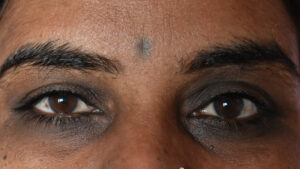Dark spots, whether from sun damage, aging, or other factors, can be a source of self-consciousness. While professional treatments exist, many turn to gentler, natural remedies within their own homes. It’s important to understand that home remedies take time and may not work for everyone. Here’s a look at some common options and what science says about them:
Important Note: Patch Test First! Even natural ingredients can cause reactions. Test any new remedy on a small, inconspicuous area before applying it around your eyes.
1. Lemon Juice: The Vitamin C Powerhouse
- How it Works: Lemon juice is rich in citric acid, which acts as a mild exfoliant, and vitamin C, a potent antioxidant that may help slow melanin production.
- How to Use: Dilute fresh lemon juice with equal parts water. Apply to dark spots with a cotton ball for a few minutes, then wash off. Do this 2-3 times a week.
- Cautions: Lemon is highly acidic, so it can irritate sensitive skin. Never use before sun exposure.
2. Apple Cider Vinegar: Balancing Act
- How it Works: Apple cider vinegar contains acetic acid, which can have a gentle peeling effect. Some claim it helps balance skin pH, which could indirectly benefit hyperpigmentation.
- How to Use: Dilute with equal parts water. Apply the mixture to dark spots as with lemon juice.
- Cautions: Similar to lemon, it can be irritating, especially for sensitive skin.
3. Aloe Vera: Soothing and Healing
- How it Works: Aloe vera contains aloin, a compound with potential skin depigmenting properties. Additionally, it has soothing and anti-inflammatory effects, which may be beneficial for post-inflammatory hyperpigmentation.
- How to Use: Apply pure aloe vera gel directly to dark spots and leave overnight. You can use gel from a fresh aloe plant or a store-bought product.
4. Turmeric: The Ancient Spice
- How it Works: Curcumin, the active component in turmeric, has antioxidant and anti-inflammatory properties. Some studies suggest it may inhibit melanin production.
- How to Use: Mix turmeric powder with milk or yogurt to create a paste, apply, and wash off after 15-20 minutes. Be aware turmeric can temporarily stain skin yellow.
5. Red Onion Extract: A Surprising Helper
- How it Works: Red onions contain a flavonoid called quercetin, which has been shown to have antioxidant effects and may have a role in reducing melanin production.
- How to Use: Apply the juice from a grated red onion or look for products with red onion extract.
- Caution: Onions can irritate the skin, especially the delicate eye area. Proceed with caution.
6. Potato: A Humble Vegetable
- How it Works: Potatoes contain an enzyme called as Catecholase, believed to have skin-lightening Potential.
- How to Use: Apply the Raw Potato slices or juices are often applied to dark spots.
- Caution: Skin may feel irritated, especially the delicate eye area. Proceed with caution by using sunscreen.
7. Green Tea: An effective Antioxidant
- How it Works: Its antioxidant properties are not only for internal health but also can be use on dark spots.
- How to Use: Use topically (applied on to the skin), green tea extracts or cooled tea bags. It will offer a mild brightening effect.
- Caution: Skin may feel irritated, especially the delicate eye area. Proceed with caution by using sunscreen.
8. Vitamin E: A potent Antioxidant
- How it Works: It has antioxidant properties are not only for internal health but also can be use on dark spots.
- How to Use: Use topically (applied on to the skin), vitamin E can be applied through oil extracted from Vitamin E capsules or mixed with any other above ingredients, it is thought to help protect against sun damage and potentially reduce existing pigmentation. It is generally used even on sensitive skin.
- Caution: Skin may feel irritated, especially the delicate eye area. Proceed with caution by using sunscreen.
Realistic Expectations and Sun Protection
- Home remedies can provide subtle improvements for some individuals but don’t expect overnight results. Consistency over weeks or months is key. Even with positive results, using any of these remedies makes your skin more sensitive to the sun. Diligent sunscreen application (SPF 30 or higher) is non-negotiable.
When to Consider a Professional
If home remedies show no improvement, or if your dark spots are severe or changing, consulting a dermatologist is vital. They can diagnose the type of hyperpigmentation and recommend medical-grade treatments with stronger and more predictable results.


